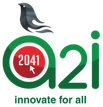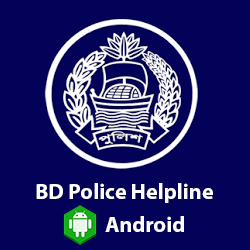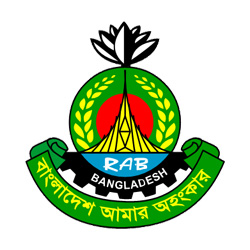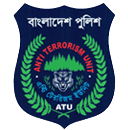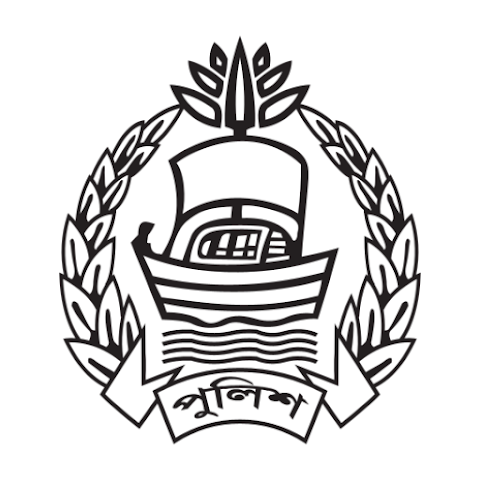Skills
Skills for Decent Employment
Leveraging the “demographic dividend” by empowering youth through meaningful skills most demanded by the market.
Skills development through Apprenticeship
Leveraging the “demographic dividend” by empowering youth through meaningful skills most demanded by the market.
A Way Out of Poverty
Ajmot Ali, an energetic young from Mymensingh, completed his Master's degree from Ananda Mohon College in Mymensingh. Like many other youths in his area, he made a lot of effort to get a job but failed to do so. Since then, he was looking for other opportunities to become self-dependent because; as a graduate, he did not want to be a burden to his family
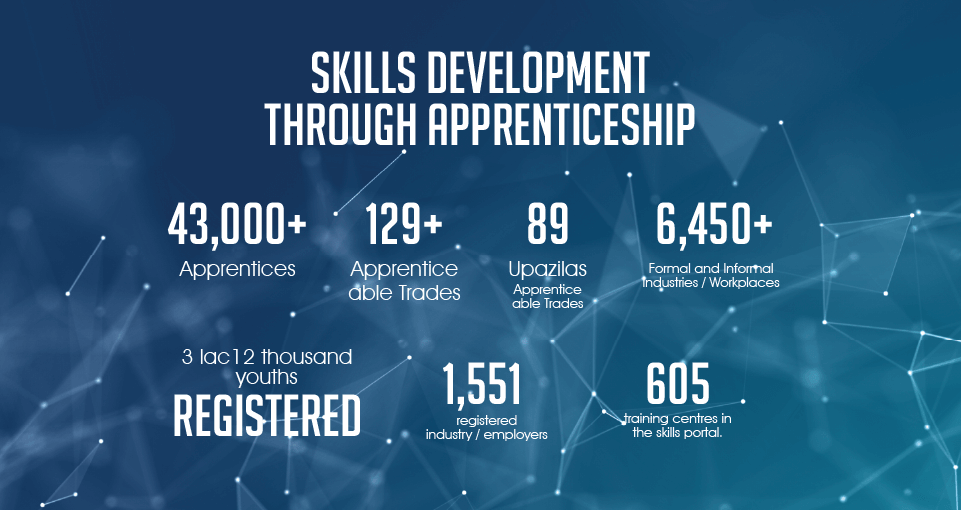
Developing an Effective Workforce for Bangladesh
Bangladesh has a total population of 159 million (BBS, 2015) and a labor force of 79 million (World Bank, 2014). With a projected labor force growth rate of 2.2% over the next 10 years, 2 million youth joining the workforce every year. Among them, 0.6 million are from mainstream education and 1.1 million are trained from government/ private skills development agencies. The rest of the forces fall within the NEET (Not in Education, Employment and Training) classification. Thus, there is a significant gap between the demand for skilled workers by the local industries and international job markets and the supply ensured by education and training centers. One plausible reason for this is the communication and coordination gap between employers and skills development agencies. Apprenticeship can be a practical solution to this problem. Apprenticeship is a significant endeavor to increase remittance per capita and ensure decent work for everyone through appropriate planning and coordination. Only with a concerted effort, it will be possible to stand up against unemployment and underemployment, and make meaningful contributions to attain SDGs 1 (No Poverty), 8 (Decent Jobs and Economic Growth), 9 (Industry, Innovation and Infrastructure), 10 (Reduced Inequalities) and eventually achieve middle-income status in the world.
As of May 2018, under its apprenticeship program covering over 450+ formal industries, a2i has enrolled over 25,000+ apprentices in important sectors like Agro-food, Furniture, Tourism & Hospitality, Construction, Leather & Footwear, etc. Important trades include wood machine operation, lacquer polishing, carpentry, food & beverage services, chef, baking, food processing, housekeeping, plumbing, tiles fitting, footwear production, etc. This number is expected to reach over 40,000 by the end of 2019. In informal sectors, through partnerships with 4,200+ informal workplaces, over 19,000 apprentices in 133 Upazillas have received training and have landed jobs. Important trades include electrical house wiring, wielding, glass & mirror fitting, mobile servicing, motorcycle mending, tailoring & dressmaking, etc. Recently, a2i has also partnered with the Department of Social Services (DSS) within the government to implement an apprenticeship program in additional 73 Upazillas touching more than 7,000 apprentices. After completing 6 months of the apprenticeship program, the trained apprentices get a certificate of NTVQF (National Training and Vocational Qualifications Framework) after assessment by the Bangladesh Technical Education Board (BTEB) whereas the Bureau of Manpower Employment and Training (BMET) issues the registration. With these certificates, apprentices are able to manage decent employment both in domestic and international job markets. Besides, to manage, monitor and mentor Apprenticeship Programme all over the country a2i has developed a National Apprenticeship Management System (www.apprenticeship.gov.bd). This system is already working as a one-stop hub to serve the stakeholders (youths, industries, BMET, BTEB and DIFE) of the apprenticeship program.
As a continuation of this approach, a2i has organized a National Apprenticeship Conference 2018 titled “Innovations in Apprenticeship: A Skilled Workforce for the Future” at Cox’s Bazar, Bangladesh dated 21-22 September 2018. This is the first-ever national conference on Apprenticeship in Bangladesh where 174 representatives of government ministries/departments, development partners, industries and skills development agencies came under one platform to identify specific roles and responsibilities of different stakeholders and ensure industry ownership in the Apprenticeship program.
a2i, as the innovation intermediary of the government in collaboration with the UK Cabinet Office-based organization Behavioral Insight Team (BIT), is also working with a whole-of-government approach applying behavior change methodologies and leveraging the rapid expansion of Apprenticeship programs countrywide to ensure demand-driven skills in Bangladesh. Globally a2i is playing an active role to develop international collaboration on apprenticeship. With the advocacy of a2i, Bangladesh has become a part of the Global Apprenticeship Network (GAN) by launching GAN Bangladesh on 21st September 2018, which is the 12th country to be included in the network. GAN works to promote apprenticeship and create work-readiness programs for youth and foster skills for business development. a2i is also leading the Alliance for Asia Apprenticeship (AAA) to share knowledge, experience and expertise in an apprenticeship with Asian countries.
SKILLS DEVELOPMENT THROUGH STIPEND
Providing income-generating skills for the higher secondary poor students alongside stipend.
In Bangladesh, the dropout rate in higher secondary education is more than 30 percent, which is significantly higher than the dropout rate at the secondary education level. Female dropout is comparatively higher than male counterparts. The main reason for this dropout is poverty and poverty-related factors. Many practical remedial measures have been taken to attract all the students, including female ones to continue their education and be part of skilled manpower. To keep this objective or goal alive and in action, the Higher Secondary Stipend Project (HSSP) under the Ministry of Education stranded function, providing a stipend at the higher secondary and higher education level. Remedial measures have been taken so that the deprived students do not drop out of higher secondary education due to financial insolvency. Under this project, the government gives stipends and other financial facilities to 40% of female students and 10% of male students admitted to the HSC level. So that the poor students have got the opportunity to continue their education.
SKILLS FOR EMPLOYMENT PROGRAMME ON RMG
Skills for Employment
Shymol Kumar has a family of 8 members and he is the eldest son of his family. He had to take responsibility for his family since his father died at an early age. As a result, he discontinued his study in class 8. To earn his family’s livelihood, he started farming. He was hardly making both ends meet. His siblings also had to give up study because of financial instability. In July 2016, Shymol got to know through their local Union Digital Center (UDC) about a two-month duration training program on knit machine operation. After successful completion of the training, Shyamol received a job placement assurance by BGMEA. He confirmed his admission in September- October session after discussing with his family. He received first-hand training on the suitor, polo shirt, t-shirt and jersey knitting. He passed the training successfully and on 1 November he joined as an operator in Niagara Textile Limited, located in Gazipur. His monthly salary is 10,000 taka with an opportunity of earning more through overtime. His income is more than that of the other operators and he can work more efficiently and effectively, thanks to the training program. He can now afford the smile of his family with his stable income. Shymol is quite optimistic that other unemployed youth would also follow his trail and ensure a better living for their families and themselves. Training of these kinds could change the macro-economic condition of the overall country, increasing the living standard of the impoverished sections of this country. Beneficiary Shymol expressed his gratitude this way- “Knit machine operation program has changed me and my family’s life. I am better off now. I can now send money to my mother every month. I am sincerely indebted to a2i” advanced digital patient follow up system for those underprivileged people.
Within 6 months of operation, the project developed 08 Upazila level CDISB under Upazilla Disabled People Development Councils (UDPDC) with advanced specialized services. This project has been developed for the purpose of social and economic of disable people in the rural areas of Bangladesh, as well as access to information with Community Digital Information and Service Booth (CDISB). All the beneficiaries of the project are physically impaired and socially discriminated. This project will be helpful to ensure access to information from various services providing organization, employment and income generation, training, capacity & skill development for the people with disabilities and it will ensure their development in a sustainable manner.
Before delving into why we need such programs a glimpse of Bangladesh is necessary where those below 30 years make up 60% of the total labor force. Most of these youth are in a perpetual crunch for money. It is either that they do not have enough to get through school or they are not earning enough to get by with their family because they don’t have the necessary skills. Given the rising population, jobs are also becoming increasingly scarce and all the more so for those without a good skill set.
These projects have been initiated keeping that in mind. The target group of the projects includes people from ethnic minorities of the plains. In each batch, 60% of participants come from those minorities. After just two months of training, people find jobs as guaranteed by the BGMEA. The figures are great too as the starting salary is Tk 25,000 in the first case and in the second scenario, the minimum salary is Tk 8,000 per month. So, they will gain much after only two months of training.
One batch — 20 participants — has successfully completed the training and joined decent jobs in garment factories. As for the second case, a2i’s result has been positive as well, as there have been four batches that completed the training and a five is underway with 30 participants in each. 120 people have secured a paying job.
To sum it up, people are now able to get a job and pay their bills. Not only do the new job holders benefit from this, but so do the employers who get properly trained employees.
Skills Development for Qawmi Madrasha Youths
Mainstreaming Qawmi Madrasha youths in the job market
A better life to cherish beyond
Mr. Rofiqul Islam, from a remote village of Mirzaganj sub-district of Patuakhali district, completed his Kafia (graduation degree) degree living at the boarding of the Mirpur Darul Ulum Qawmi Madrasha as in a family of seven it was hard for his family to bear his educational cost. He passed his hardest day to obtain this degree but after completing he found there are very limited job opportunities.
This made him realize that he needs to do something else to be economically solvent. In 2016, through Qawmi Madrasha Education Board ‘Iqra Bangladesh,’ he got to know about the a2i program which is going to provide technical and vocational training for Qawmi Madrasah students. He felt like he found the light of hope and immediately applied for the training. After completing training on driving from the Bangladesh Road Transport Corporation (BRTC) and successfully passing his driving exam from Bangladesh Road Transport Authority (BRTA) now he is earning monthly 20,000 Taka working as an Uber driver which contributed to the betterment of his family.
Mr. Rofiqul Islam said, “I believe all Qawmi Mardasah students need to take part in this initiative of a2i and utilize their valuable time. Such training will help to develop their technical skills and increase their earnings. Inclusion of Qawmi youths into the main workforce will also make a remarkable contribution to the GDP growth of the nation.”
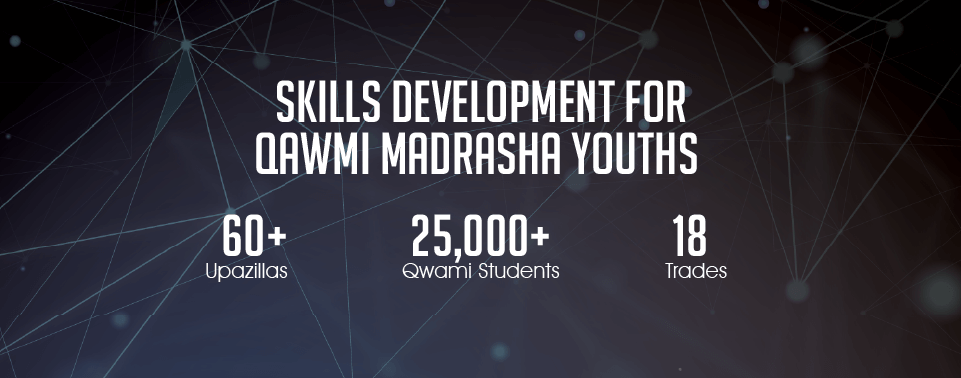
Skills Development for Qawmi Madrasha Youths
Reconstructing the Mindset of Qawmi Madrasha
In Bangladesh, a total number of 4 million students are studying in 13,902 Qawmi Madrashas across the country. Based on studies, among these students 75% are male and 25% are female. The major limitation of Madrasha education is putting emphasis on religion education only without promoting other skills that are compatible with modern job market demand today. In most circumstances, motivation for receiving income-generating skills is absent and the Qawmi Madrasha students are not convinced that receiving technical and vocational education is important. Due to the absence of updated and mainstream knowledge, the graduates produced by Madrashas are unable to improve their career prosperity. Their job opportunity is restricted to mosques and madrashas only where the salary ranges between 2000 and 10000 which is very low for any graduate. As a result, after graduating Qawmi Madrasha students face a poor living standard.
To engage Qawmi Madrasha students with the mainstream, the Government has provided many vocational and technical programs as well as some job opportunities. But most of the students did not get a chance to receive income-generating skills. So, a2i and the Qawmi Madrasha Education Board ‘Iqra Bangladesh’ have jointly taken a revolutionary intervention to provide technical and vocational training for Qawmi Madrasha students to turn around their lives through skills development and job placement. Under the skills development program, they are receiving at least one skill that is in great demand in local and foreign markets alongside their traditional curriculum. Most of the time Qawmi Madrasha students receive training in formal and informal trades so far, 25,000+ youths have got the training. This program is supported by different training providers such as-Department of Social Services, the Department of Youth Development (DYD), the Bureau of Manpower Employment and Training (BMET), the Department of Women Affairs (DWA) and Bangladesh Road Transport Corporation (BRTC).
Currently, through the countrywide training program, Qawmi students have received skills in different trades such as Electrical House Wiring, Aminship (land survey), Mobile Servicing, Graphic Designing, Tailoring, Block-boutique, Nokshikatha, Agriculture, Livestock, Pisciculture, Horticulture, Driving and Afforestation. Through this training, the students have developed their skills to generate more income and overcome their mental and financial constraints as well as ultimately benefit the country.




